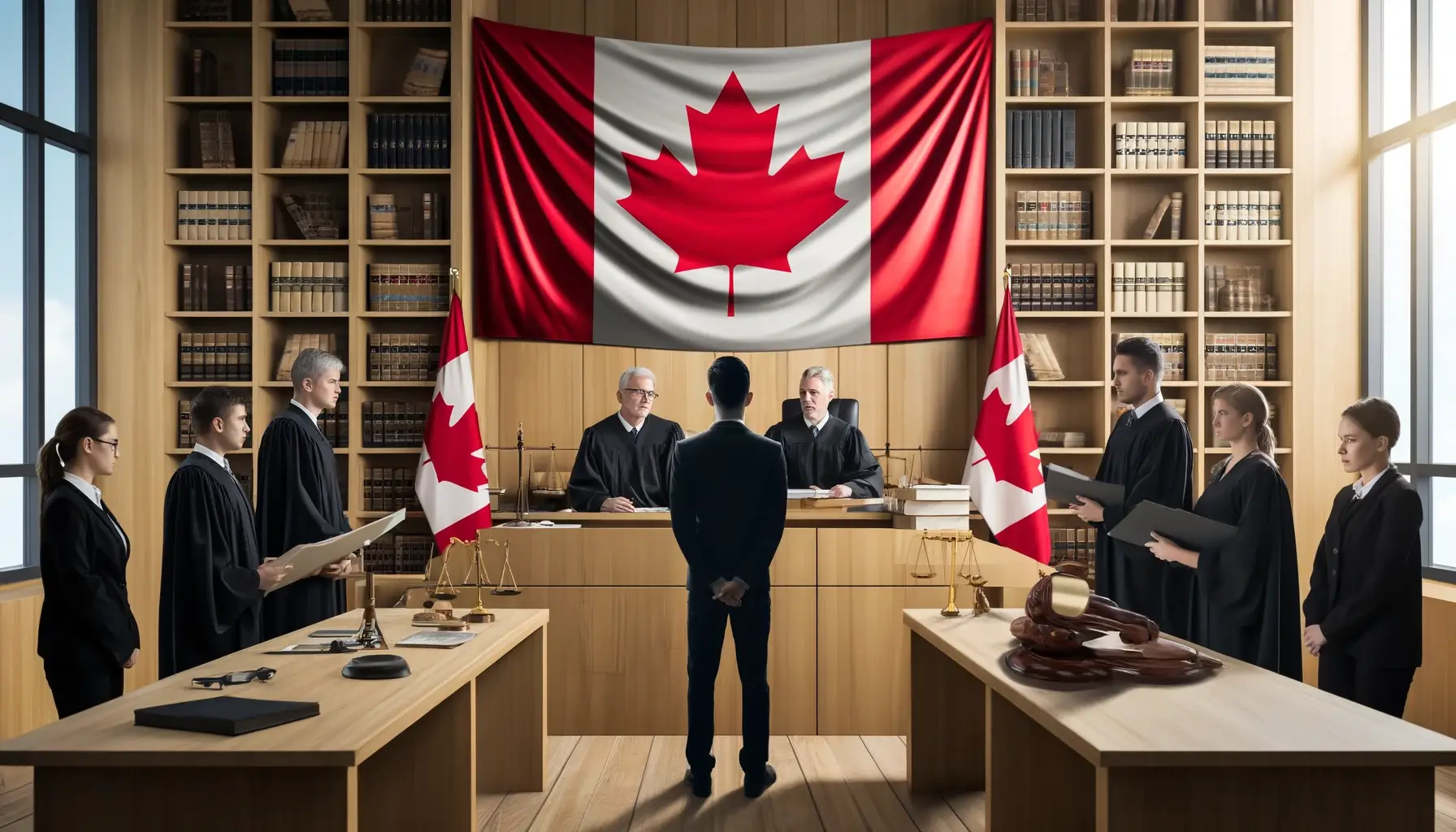Navigating these updates can feel like a lot. That’s why we made this guide. We will simplify the most important recent changes to Canadian criminal law. We will give clear explanations and useful examples to help you understand it all better. Here’s what we will cover:
- Bail Changes: New laws have made it harder to get bail in certain situations. This includes cases with repeat offenders, weapon offenses, and violence between partners. We will explain how Canada’s bail system works now and what it means for those facing charges.
- Sentencing Changes: Changes to sentencing laws have changed the use of minimum sentences. They have also made conditional sentences available for more offenders. These changes can greatly change the length and harshness of punishments.
- New Crimes and Defenses: Recent years have brought new laws that make it a crime to share intimate images without consent. There have also been changes in how extreme intoxication is treated as a defense. These changes can have big effects.
Key Changes and What They Mean in Canada
New Offenses: Canada’s Criminal Code is changing. The government has created new criminal offenses. A key example is the new laws against sharing intimate images without consent, often called “revenge porn.” These new charges show how society’s concerns are shifting and create legal options that weren’t there before. In recent years, there have been many updates to Canada’s Criminal Code. These changes highlight the focus on public safety and the ongoing work to change laws based on the Supreme Court of Canada decisions related to the Canadian Charter of Rights. Let’s look at the most important changes and think about their impact.
Bail Reform: A Focus on Public Safety
Bill C-75 (which got approval in 2019) and the newer Bill C-48 show important changes to how bail works in Canada. These changes aim to improve public safety. In some situations, this could mean tougher bail conditions. It also puts more pressure on the accused person to explain why getting out before trial is right.
Key changes from this law include:
- “Reverse Onus” Rules: In some cases, the accused must show why they should get bail. This is a change from the old rule where the Crown had to prove why they should stay in jail. These “reverse onus” cases usually occur if there are past serious offenses or charges related to intimate partner violence (IPV).
- More Reasons for Detention: Judges can refuse even fair bail due to things like the accused’s criminal record, worries about trust in the justice system, and risks to a person’s or the community’s safety.
- New Rules for Processing: Before, people accused of less serious crimes could be released right by police at the scene. Now, they often need a bail hearing with a judge, which may lead to longer times in custody.
Sentencing Adjustments: A Balancing Act
Recent changes have affected how judges give criminal sentences. These changes show a mix of ideas about punishment, stopping crime, helping offenders, and addressing worries from Supreme Court decisions about the fairness of minimum sentences.
- Less Dependence on Set Minimums: Judges can now make more choices in some cases where set minimum sentences used to apply. Even though minimum sentences are still in place for serious crimes like homicide, there is more flexibility for some drug crimes and gun-related offenses.
- More Options for Conditional Sentences: Conditional sentences, which let offenders spend time in the community under strict rules, are now easier to get for some crimes. However, the changes also limit these options for crimes with maximum sentences of 14 years or more.
- Focus on Mental Health: Changes look at the large number of people with mental health and addiction issues in the justice system. They stress the importance of treatment and finding better options when needed.
New Defence and Offence: Reflecting Social Shifts
The Criminal Code is not fixed. The government of Canada makes new laws to deal with changing behaviors and to protect human rights. At the same time, how society understands things can change. This can lead to changes in the defenses that people have when facing criminal charges.
- Non-Consensual Distribution of Intimate Images: This is a new crime that helps victims of “revenge porn.” It shows how the law is changing to deal with harms done through digital means.
- Extreme Intoxication Defense: In recent years, the law about using intoxication as a defense has become clearer. The goal is to keep a balance. We need to acknowledge serious impairment while also keeping public safety and the rights of victims in mind.
- Focus on Indigenous Peoples: Canada is still facing issues with too many Indigenous peoples in the criminal justice system. While some changes in law are important, taking steps like using Gladue reports more often at sentencing shows efforts to create a fair and meaningful path to justice.
Important Considerations:
- Seek Legal Help: This overview is just a starting point. Canadian criminal law is complicated, and recent changes can apply differently based on your case. Talking to a skilled criminal defense lawyer is the best way to get a full and trustworthy analysis.
- Regional Differences: While the Criminal Code needs to be followed everywhere, regional laws also affect how the law is enforced and justice is served.
- Ongoing Changes: Canadian criminal law is constantly changing. It is influenced by public discussions, decisions from the Supreme Court of Canada, and the goals of the federal government. Keeping up with these changes is important.
How the Latest Changes to Canadian Criminal Law Might Impact You
The real effects of changes to Canadian criminal law depend on your personal situation. To show how it might affect people, let’s look at some possible situations:
Scenario 1: Facing Assault Charges
- The Situation: You have been arrested after a fight that hurt another person. You say you were defending yourself.
- How Changes Matter: Changes to bail laws, especially for repeat offenders, could make getting release before the trial harder. Also, recent updates to the self-defense laws have made it clearer and somewhat broader what actions can be seen as okay. Knowing these details is very important when you build your defense.
Scenario 2: Drug Possession Charges
- The Situation: You are facing charges for having a controlled drug. You intended it for your own use, but you have more than what is normally seen as a small amount.
- How Changes Matter: Changes to drug laws have changed how some drugs are classified. This may change how possession or dealing charges are handled. In recent years, there has been a move toward programs for certain offenders. These programs may offer a different way than usual punishment. Who can join and the rules of these programs can change based on new laws.
Scenario 3: Accused of Sharing Private Images
- The Situation: A former partner is threatening to share your private photos or videos without your permission.
- How Changes Matter: Sharing intimate images without consent is now a crime in Canada. These new laws give victims a way to seek justice, allowing them to prosecute those who cause this harm.
Scenario 4: Concerned About a Past Conviction
- The Situation: Years ago, you were found guilty of a crime that now has a lighter minimum punishment.
- How Changes Matter: Changes to the law may let you have a new hearing. You could get your punishment reduced based on the new rules.
Important Considerations
- Counties Matter Too: This article looks at changes to the Criminal Code made by the federal government. But, county and area governments also make laws that change criminal justice. For example, some counties have specific laws for intimate partner violence that could be important along with federal charges.
- The Need for Legal Help: These examples are simple. The law is complicated. Talking with a criminal defense lawyer is the best way to understand how recent changes to Canadian criminal law impact your case.
- More Than the Courtroom: Changes in Canadian law can affect things outside of criminal charges. Think about how updates to drug laws or sentencing rules could change job screenings, access to rehab programs, or how society views people in the justice system.
Have You Been Staying Informed?
Canadian criminal law is always changing. It’s important to know about updates that might affect your rights. If you have criminal charges, working with a good lawyer is very important. They can help you understand the changing laws and make sure your rights are safe at every step.
What to Do If You’ve Been Accused
Facing criminal charges is very stressful and can feel overwhelming. No matter what the accusations are, what you do right away can greatly affect how your case turns out. Here’s what you should do:
- Exercise Your Right to Remain Silent: It can be tempting to explain yourself, but anything you say to police can be used against you in court. Kindly refuse to answer questions without your lawyer there.
- Contact a Lawyer Immediately:
- Follow Your Lawyer’s Instructions: Your lawyer is there to help you. They want the best outcome for your case. Pay close attention to their advice and be honest about your situation. This helps them build a strong defense for you.
- Understand the Process: Your lawyer will go over the legal steps with you. This includes bail hearings, court dates, deal talks, and possibly a trial. Knowing what will happen can help ease the stress you feel right now.
The Jeffrey Reissman
Facing the Canadian criminal justice system alone can feel very tough. We know this is a stressful and uncertain time for you. Jeffrey Reissman is a skilled criminal defense lawyer. He has a strong history of standing up for his clients’ rights. He will use his legal knowledge and the latest updates in the law. This way, you will get the strongest defense available.
Don’t risk your future. Acting quickly is important. Get in touch with us today for a private meeting.



